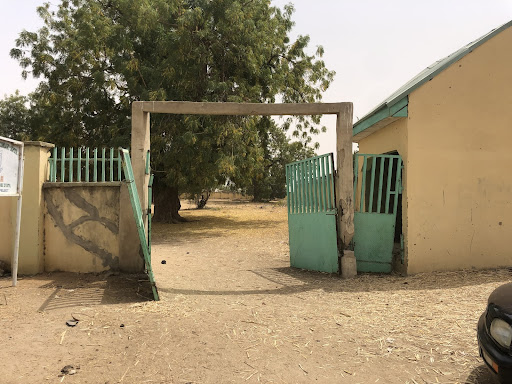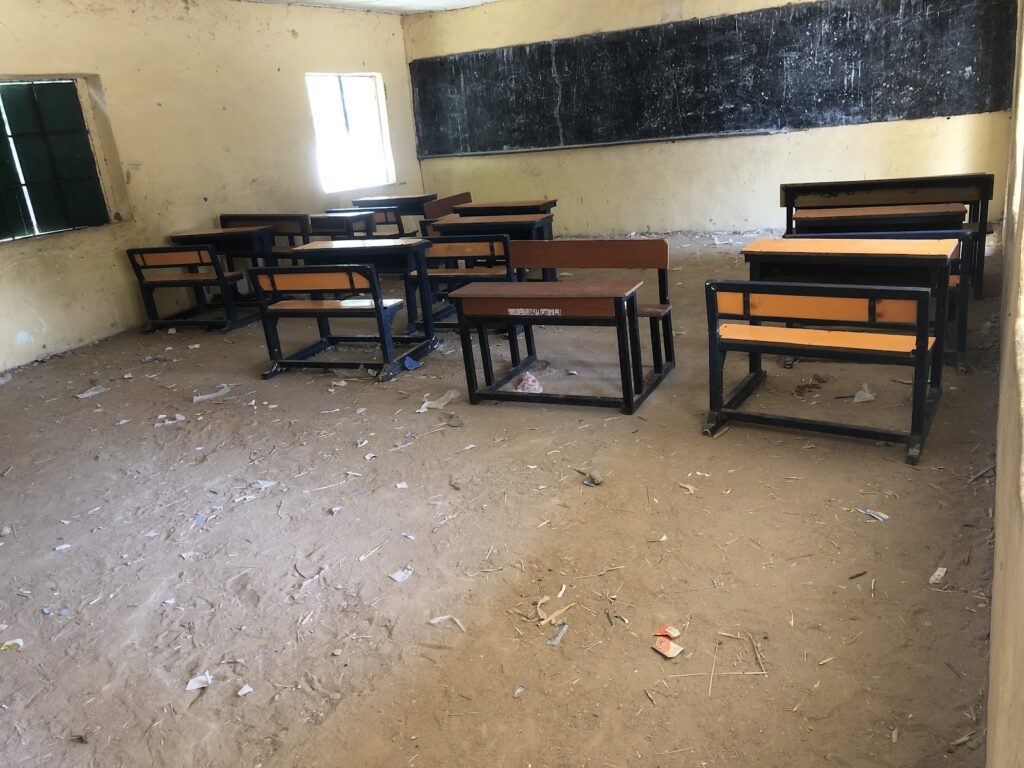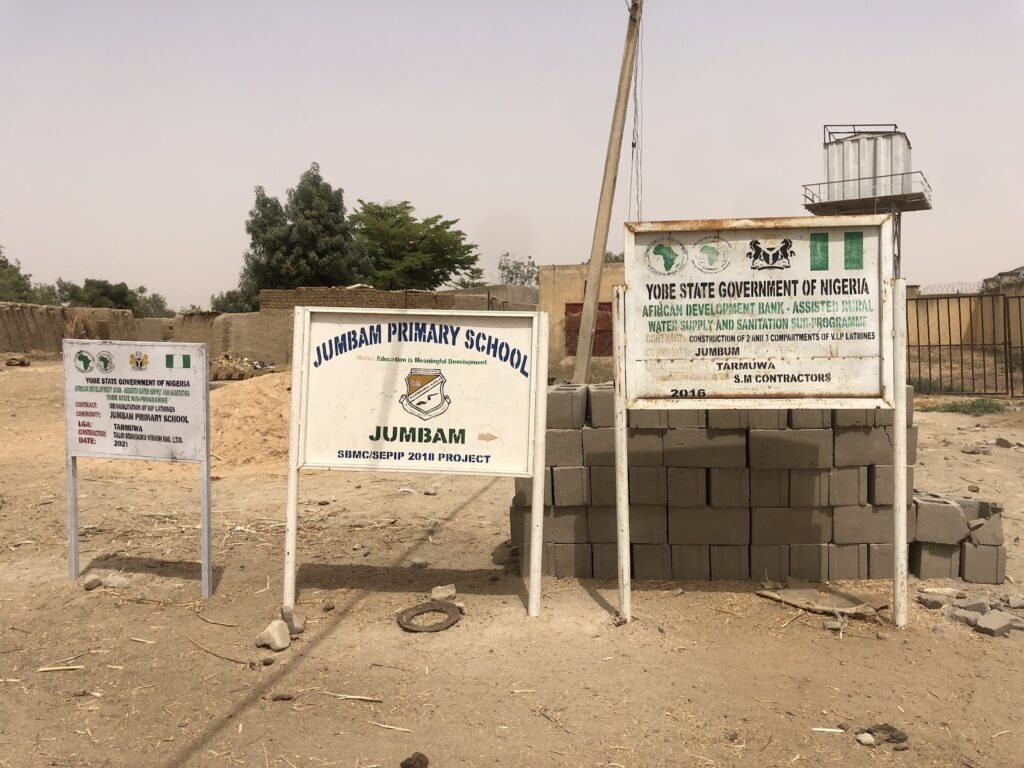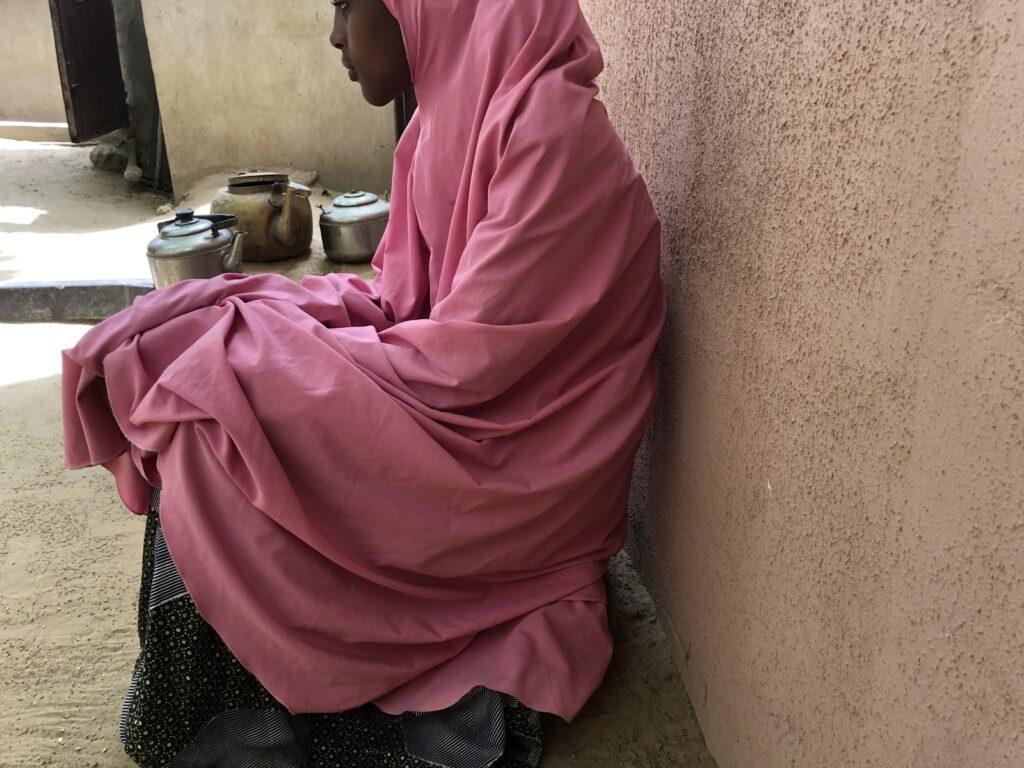#DapchiAbduction: The Dapchi Girls’ Dashed Hopes Of Education, Empowerment
The Nigerian government’s first response to school abductions is usually to move the school to locations considered safer. This is counterproductive for people like Aisha who, after the Dapchi abduction, has had to drop out and give up hopes of finishing school.

Somewhere in Jumbam, a town five kilometres away from Dapchi, northeastern Nigeria, a school stands with broken gates. One end of the gate leans outside, the greater part of it unhinged. It is a wonder it hasn’t fallen off completely. It likely will, when the storms arrive later in the year. For now, it continues to enjoy the grace of whatever is holding it together.
Inside the school compound, there are large trees. From the gates, one can count up to five. Inscriptions on some of the blocks say that the school was renovated as early on as in 2017. But the classrooms still look like a work in progress; the floor isn’t finished, the chairs are scarce and in disarray.
“Every day you will see them renovating the school, like some university,” Alhaji Adamu, a resident of the area tells HumAngle. He does not sound pleased by the fact. It is understandable.

It is the only school available in the immediate vicinity, and it is not enough because it offers no quality education. There are only three functional teachers in the school, according to multiple residents of the area, including the district head. HumAngle could, however, not verify this claim because, when we visited the school, there were no teachers at all and the classrooms themselves looked deserted. Nearby residents said it was because the school had closed for the day. A security man who lingered around confirmed that the school was nearly always deserted.
Many of the girls in the town used to be boarding students at the Government Girls Science and Technical College, Dapchi. But that was before terrorists stormed the school in Feb. 2018 and abducted about 115 schoolgirls.
Relocation as a response to school abductions
After the girls were brought back by the same people who took them, a month later, the school was moved to Nguru, a town about 150km away from Dapchi. The same course had been taken by the government after the Chibok abduction in Borno State. The schools around Chibok, Damboa, and other nearby towns had been moved to the state capital, Maiduguri, and students were then required to move to those places. It was not completely successful. One resident and activist, Aishatu Kabu Damboa, told HumAngle that from 2015 to 2018, most of the schools around the town, like the Government Girls Technical College, Damboa, were relocated to the state capital.
“It is not even the students that were relocated to the state capital,” she said. “It is the entire school structure. Multiple schools were merged together in order for students to continue to access education. This was the situation from around 2015 to 2018. But after the current Borno state governor came into power, the schools started being relocated to their original locations.”
The school in Chibok itself was finally reopened last year, after about seven years.
Kabu also highlighted the problems associated with the relocation, especially as regards social exclusion within schools that are merged, as the original students tend to feel superior to the visiting students. Her claims corroborated HumAngle’s recent investigations into the welfare of the Chibok girls currently enrolled at the American University of Nigeria (AUN).
Parents of the Dapchi girls and the students themselves say no efforts were made to see to their successful transfer to the school’s new location. Further, the fact that rather than secure the area where the abduction had occurred, the school was moved to a relatively safer town, contributed to residents losing confidence in the government’s ability to protect them.
After the abduction, therefore, there was little reason for them to go back to school. For one, they had been warned by the terrorists not to.
“They warned us that if we go back, they will abduct us again and this time they will not bring us back,” one of the girls told HumAngle.
A safer option for the girls in Jumbam would have been to attend a school within their community and close to home, but the quality of education in the available schools around the environment is so weak that it dissipates any desire for students to continue learning. The weak structure is across all educational levels in the town, but it especially affects primary schools.

“Usually, after primary school education, we send our children to other places to continue secondary school in boarding schools. But it does not make sense that we send them to other towns again for even their primary school education,” says Ado Hassan, a young man whose sister had been abducted during the Dapchi abduction. She was one of the five who did not make it back alive.
“And we all know that primary school is very fundamental. They keep renovating the school all the time but they never equip it with the teachers needed,” Alhaji Adamu says.
Ado Hassan thinks that it is not a matter of teachers not being employed, but of them not showing up to do their jobs and yet getting away with it.
After the Dapchi girls regained freedom, some of the girls dropped out and got married; some only dropped out. Others transferred to Islamic schools, especially in Damaturu. Like Aisha.
Aisha’s abduction
Aisha remembers that on the day of the abduction, she had been sitting next to her sister, Maimuna, in the dormitory.
“Usually, whenever it was time or nearly time for her to break her fast, I would spread a mat for her to sit on.”
That day was no different. She had spread the mat.
And then the gunshots came. Followed closely by the stampede. They got up and immediately found their way to where they considered the safest part of the school — the administrative section. It didn’t seem safe either, so they ran towards the gate. There, they ran into terrorists, dressed in full military gear.
“They lied to us that they were from the military to rescue us. But we were too scared to follow them. Then they started to forcefully hurl us into the truck. We got injured in the process.”

It was in the process that Maimuna’s health deteriorated. “She was trampled upon. We were holding hands the whole time but she was trampled on. And she was very hungry and thirsty. She kept crying out for water and I kept echoing her cries too. I was begging them to give us water but they didn’t. Until she died.”
Back from the wilderness
Once back home in Jumbam, Aisha, like many others, did not return to school. Instead, she enrolled at an Islamic school in the state capital, Damaturu.
She notes that the lack of follow-up from the government contributed to her not going back to school. Asked what she would like, she replied that she wished to be empowered.
She had heard that there were empowerment materials distributed to the Dapchi girls who resided in Damaturu and Dapchi, but those of them in Jumbam, perhaps because it is a small town, were not extended the gesture.
“It would have been great to get things like those sewing machines that they gave our mates in Damaturu,” she said.
For many other residents, especially families of the girls, having quality education in the town would be a great start. The Jumbam Primary School would be an even better start.
“We do not have access to proper education here,” Ado Hassan said.
This report is a partnership between the African Transitional Justice Legacy Fund (ATJLF) and HumAngle Media under the ‘Mediating Transitional Justice Efforts in North-East’ project.
Support Our Journalism
There are millions of ordinary people affected by conflict in Africa whose stories are missing in the mainstream media. HumAngle is determined to tell those challenging and under-reported stories, hoping that the people impacted by these conflicts will find the safety and security they deserve.
To ensure that we continue to provide public service coverage, we have a small favour to ask you. We want you to be part of our journalistic endeavour by contributing a token to us.
Your donation will further promote a robust, free, and independent media.
Donate HereStay Closer To The Stories That Matter




